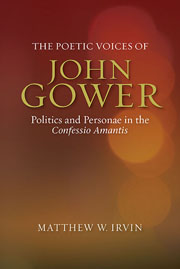Book contents
- Frontmatter
- Contents
- Dedication
- Acknowledgements
- List of Abbreviations
- Introduction: Making and Doing Love
- 1 The Inheritance of the Confessio Amantis
- 2 The Orientation of the Prologue to the Confessio Amantis
- 3 Amorous Persons
- 4 Pity and the Feminine
- 5 Labor and Art
- 6 Alienation and Value
- 7 The Love of Kings
- Conclusion: Identifying Amans
- Bibliography
- Index
- VOLUMES ALREADY PUBLISHED
4 - Pity and the Feminine
Published online by Cambridge University Press: 05 March 2014
- Frontmatter
- Contents
- Dedication
- Acknowledgements
- List of Abbreviations
- Introduction: Making and Doing Love
- 1 The Inheritance of the Confessio Amantis
- 2 The Orientation of the Prologue to the Confessio Amantis
- 3 Amorous Persons
- 4 Pity and the Feminine
- 5 Labor and Art
- 6 Alienation and Value
- 7 The Love of Kings
- Conclusion: Identifying Amans
- Bibliography
- Index
- VOLUMES ALREADY PUBLISHED
Summary
In the previous chapter, I argued the “Tale of Florent” encourages clerical and noble readers to employ their respective resources to examine the moral value of gentilesse and their own implication within it. The primary issue is the status of gentilesse in terms of actio and factio: is the code of courtly behavior and erotic love oriented toward real virtue in the real world, or is it a fiction, made to appear decorous and proper in order to screen immoral action? A close reading of the “Tale of Florent” shows that both of these are possible: while a certain kind of clerical reading can reduce the tale to a fictional integumentum, and reveal deeply troubling moral and political problems in its structure, this allegory is not the only way to read it. Genius' narrative can work as an ethical art of love, encouraging trust, humility, and faith on the part of the lover by suggesting erotic pleasure as a just reward. These contradictory judgments work like the riddle of the tale itself, for it makes the noble, masculine, prudential judgment the object of analysis.
The “Tale of Florent” sets the terms for noble, masculine self-examination through the remaining narratives of the Confessio's Book I. The possibilities for philosophical allegory and practical advice in the “Tale of Florent” are reflected in the pool and predicament of Narcissus.
- Type
- Chapter
- Information
- The Poetic Voices of John GowerPolitics and Personae in the Confessio Amantis, pp. 114 - 156Publisher: Boydell & BrewerPrint publication year: 2014



